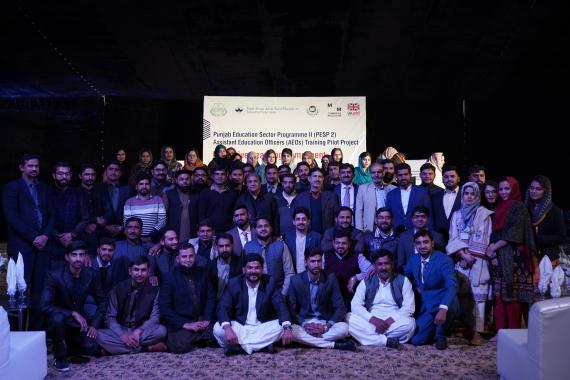
In collaboration with the Quaid-e-Azam Academy for Educational Development (QAED), the LUMS Syed Ahsan Ali & Syed Maratib Ali School of Education (SOE) piloted the Punjab Education Sector Programme (PESP) II, Assistant Education Officers (AEOS) Training Pilot Project across four districts of Punjab; Chakwal, Faisalabad, Mianwali and Bahawalpur. The Programme targeted approximately 360 Assistant Education Officers (AEOs). The intervention was premised on the hypothesis that redesigning training processes that engage AEOs in the delivery of mentorship and support from the earliest stages of their induction can play a significant role in converting their role from a largely administrative and monitoring one into a majority school mentorship and support role.
The pilot concluded with the Reflective Learning Component stakeholders in a two-day conference at LUMS from January 24 – 25, 2020, in which the trained Master Trainers (MTs) and Assistant Education Officers (AEOs) reflected on lessons learned and challenges encountered during the project. They discussed how problems were solved using data, structured research approaches to assessing the school environment, and empathic/experiential leadership to motivate and guide school (leadership) despite evident constraints to AEO autonomy. The conference sessions were designed to enable a cross-fertilization of ideas on various themes across districts and allow participants to have direct interface with the LUMS SOE Faculty, especially the AEOs who did not receive any direct training from faculty. To capture a plethora of diverse perspectives during sessions, the participants were divided into groups based on gender, district, designation of MT (AEO versus non-AEO) and trainer/trainee (MTs versus AEOs).
Day 1, Friday, January 24, 2020, started with an opening plenary where Dr. Tahir Andrabi, Dean SOE, and Dr. Mariam Chughtai, Associate Dean and Assistant Professor SOE, addressed the Master Trainers and Assistant Education Officers. While addressing the AEOs on the importance of Adaptive Leadership and communities of practice, Dr. Andrabi said, “There’s a difference between blame and responsibility. You may not be a part of the problem. Try to be a part of the solution.” Dr. Chughtai, while highlighting the importance of teamwork said, "In adaptive work stakeholders gain and lose together."
The conference included faculty moderated sessions including Efficacy of the Training Pilot, Effectiveness of the Training Implementation, Impact of the Education Leadership and Management (ELM) Curriculum, Communities of Practice as a Systemic Approach to Improving Schools , Use of Blended Learning Technology and Experiential Leadership Learning. The sessions focused on themes in which key curricular concepts were reinforced. While giving feedback on the AEO Pilot Training project, a Master Trainer said, "After the training I have started taking ownership of the system. Previously I used to restrict my role to reporting and reprimanding but now instead of just reporting flaws, I try to think from the teacher's point of view. In this way, I feel more responsible."
Day 1 concluded with a dinner. A female AEO, while reflecting on her experience during the project said, "This training project helped us take a more solution-oriented approach towards problems. This has enabled us to diagnose and solve problems.”
On Day 2 of the conference, discussions pivoted towards the theme, ‘Planning for Sustainability and Scalability’ in the Breakout sessions, Consultative Session with District QAED staff and CEOs and stakeholder meeting.
In the Breakout Sessions, the participating MTs and AEOs debriefed in groups of 10 to draw up a scale-plan for rolling out the training in the remaining 32 districts of Punjab, with a specific focus on learning and challenges during the pilot and recommendations for the scale-up phase. Dr. Mariam Chughtai during a focus group discussion said, "We need to develop enough trust between the master trainers and AEO trainees, that when asked a question to which they don't know the answer to, the MTs can openly say so."
In the Consultative Session, LUMS Faculty engaged with District QAED Heads and the District Education Authority (DEA) leadership from the four districts to deliberate upon strengthening scaling up through learning from implementation.
In the Stakeholder Meeting, academics, experts from the Punjab Education Sector Programme II and III (PESP 2 and PESP 3), leadership from the District Education Authority (Punjab), and the implementing partner QAED, were invited to discuss the sustainability of scaling up the pilot.
The day concluded with a closing ceremony and lunch. Senior leadership at LUMS including Dr. Arshad Ahmad, Vice Chancellor, Dr. Kamran Asdar Ali, Provost, Dr. Andrabi, Dr. Chughtai, and Dr. Tayyaba Tamim, Associate Professor, SOE addressed the audience. While sharing his views on the project, Dr. Ahmad said, "The AEO project is a not just a project of the LUMS School of Education but the whole of Pakistan." Dr. Tamim also shared her thoughts during the closing ceremony and said, "Change is never external, and you can never wait for it. You have to bring about change on your own. If you believe nothing can happen, then nothing will happen."








